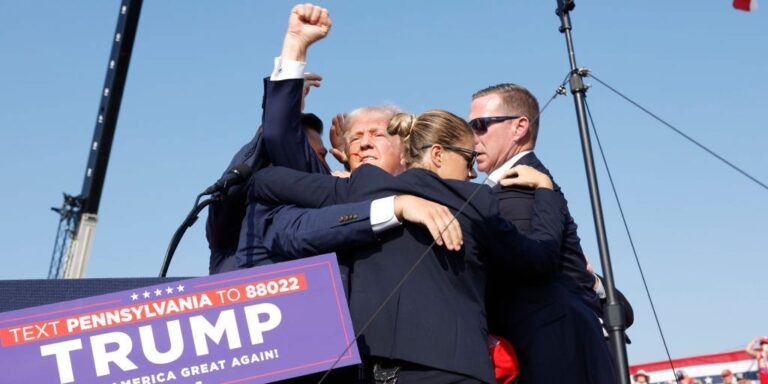This is an essay based on a transcript of a conversation with a certain person. David HeadHe is a historian, author, and lecturer specializing in American history at the University of Central Florida, Orlando, Fla. Edited for length and clarity.
When I first learned that the former president had been shot, I was shocked.
And there is an uneasy feeling that the U.S. and the world are slipping back into the turmoil of the 1960s and 1970s, when political assassinations, bombings and riots marred election campaigns.
As a historian and lecturer at the University of Central Florida, I specialize in conspiracy theories in early and 20th century American politics, especially Assassination of John F. Kennedy 1963.
However, I don't think this attempt will have a significant impact on the outcome of the 2024 election. Historically, elections have been won or lost based on the circumstances under which they occurred. Assassination attempt.
The assassination attempt most similar to that on President Trump in history ended in defeat.
The closest parallel, though very different, is the 1912 assassination attempt. Theodore Roosevelt Like Trump, Roosevelt had already served as president while running for president, but he left office after two terms and four years to be succeeded by Republican William Howard Taft.
In the 1912 election, Taft was the official Republican candidate, but Roosevelt decided to run as a third-party independent. Both men faced off against the Democratic candidate, Woodrow Wilson.
At a campaign event in Milwaukee October 14, 1912Roosevelt was shot while getting into his car on his way to a campaign speech.
Despite his injury, he attended the event and continued to speak, Roosevelt understanding the drama of giving a speech with a bloodstained shirt on.
Like Roosevelt, Trump is a born showman and likely didn't need to think about how to respond because he knew how powerful a rebellious image could be in the eyes of the media.
Roosevelt's popularity soared after the incident, and because the shooting happened in October, very close to the election.
But in the end, the Republican Party split between Taft and Roosevelt, and Taft lost to Wilson. Whether Roosevelt was shot or not did not change the balance of the election.
The assassinations of JFK and Robert Kennedy made a difference in the outcome of the election.
After John F. Kennedy was assassinated on November 22, 1963, Lyndon B. Johnson became president. Johnson enjoyed immense popularity for over a decade. Approval rating: 75% — Benefiting from the Kennedy assassination, he rode that popularity to a landslide victory in the 1964 US presidential election.
However, as the Vietnam War dragged on throughout his term, Johnson's popularity waned, and by 1968 his support among Democrats had dwindled, leading him to abandon his presidential bid early in the election.
While seeking the Democratic nomination, Robert F. Kennedy He was shot and killed after a campaign event in Los Angeles in 1968. Due to his brother's legacy, he was a leading candidate to succeed Johnson as president and run against Nixon.
The assassination of Robert Kennedy made it easier for Johnson's vice president, Hubert Humphrey, to win the Democratic nomination, but Robert Kennedy's death and the chaos that surrounded it reinforced the perception of the Democratic Party as in disarray. Richard Nixon, who led a unified Republican Party, became president in 1968.
The two tragic deaths have had conflicting political outcomes based on race status.
Political dynamics have more influence than assassination attempts
In 1975, one year before the next presidential election, Republican President Gerald Ford was shot twice. Ford had taken over the presidency after Richard Nixon resigned in August 1974. The Watergate Scandal.
Ford pardoned Nixon and tried to move past Watergate, but the Republican Party could not get past Nixon's notoriety and Ford's denial of his wrongdoing.
Ford lost the 1976 election, but only because the fundamental dynamics of the campaign – the assassination attempt – had little or no impact.
As this election suggests, elections can change quickly.
And now Donald Trump Kamala Harris.
Trump is assassinating His speech And social media messaging. Speaking at the Republican National Convention, he wore a bandage over his ear and said he had recently “taken a bullet for democracy.”
I expect this to be part of his campaign going forward. This shooting has energized the party. Republican Convention A few days later.
The intensity of enthusiasm at the Republican convention influenced Biden's withdrawal, as he was already facing calls to withdraw over concerns that health issues would prevent him from winning the November election.
But as with these historic assassination attempts, it's the campaign context that matters on Election Day.
No one is undecided about Trump right now. He has dominated political and cultural discussion since 2015, and if people's opinions hadn't already been made up, this shooting is unlikely to change them.
Kamala Harris has a chance to make her first impression as a presidential candidate, and it will be interesting to see how she handles it.
Considering the outcomes of past presidential assassination attempts and what they mean for the future is instructive but not conclusive: the situation can change rapidly, as has happened multiple times in this election campaign.


